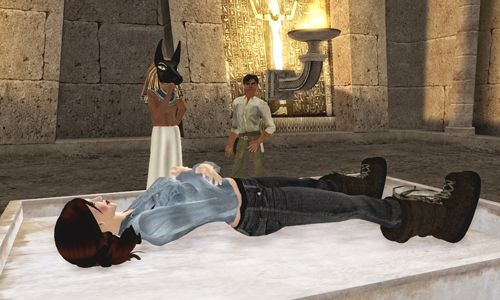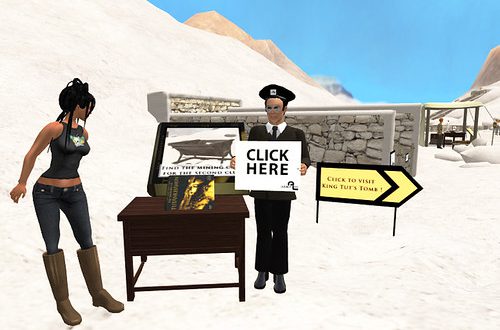 So how do we create virtual entertainment that’s meaningful where there are no guns and no sex and still fun and educational? Is it possible? This is the subject of this week’s Bloggers Challenge, and your chance to have your say on this fascinating issue.
So how do we create virtual entertainment that’s meaningful where there are no guns and no sex and still fun and educational? Is it possible? This is the subject of this week’s Bloggers Challenge, and your chance to have your say on this fascinating issue.
Kids are exposed to so much violence in their daily entertainment that it becomes an acceptable norm for them and while using anything virtual or online they expect the same level of excitement that they get from games. When we were doing some user testing with high school kids as part of the production of an online game recently, they were getting a bit agitated as they couldn’t find anything to chase, kill or shoot.
Technology is playing an increasing role in children’s educational experience. From the classroom to the home, technology is now part of how children learn, play, and communicate. Children meet their first gadgets as early as one year old, with toys like the Leapfrog learning system, and soon move onto the harder stuff such as the Nintendo and Playstation consoles.
On one hand, it is hard to ignore the positive role that games, websites and virtual environments can have in helping teach our children about the world (check out Malcolm’s excellent article about edutainment here) and guide them through life. On the other hand, we might be worried about the sex and violence that our children could encounter in the games and online environments that they engage with. Even cute little creatures like Pokemon characters can be extremely violent.
The challenge is to create content that’s actually entertaining in a meaningful way that manages to educate our children without the element of violence and sex in it – and that is quite a challenge!
Steamfish to Stonehenge
With new virtual projects like our own Stonehenge Virtual, children and adults can learn, play and explore without having to kill anyone. There is no violence, sex or car-jacking in Stonehenge Virtual (although there is a bit of a bumpy cart-ride at one point).
Another example is an online game that we (Rezzable, the creators of Heritage Key) designed for a touring theatre to be used in high schools. Steamfish was an online game to support Y Touring ’s Starfish production. In the game, students learn about clinical trials, and diseases like scurvy, through questing in an online virtual 3D environment. The Steamfish website holds all the information that the students need to learn more about scurvy and clinical trials, and is also a hub where they can see their scores, watch videos and access other relevant sites.
 When designing an educational game like Steamfish, it’s crucial – and extremely difficult! – to make it exciting enough to keep the students engaged enough to keep playing the game for long enough to work their way through the different levels of challenges, whilst also teaching them.
When designing an educational game like Steamfish, it’s crucial – and extremely difficult! – to make it exciting enough to keep the students engaged enough to keep playing the game for long enough to work their way through the different levels of challenges, whilst also teaching them.
Participation and Rules
As the subject of Bloggers’ Challenge 4, we are asking you to consider how best to grab – and keep – the attention of the GTA generation. Is it possible for online virtual educational projects to compete with mass market entertainment? If so, how? Incorporating these issues and more, the question of this Bloggers Challenge is:
How Much Fun is Virtual Edutainment?
Over the next two weeks, interpreting and answering this question gives you the opportunity to win five books of your choice from Thames & Hudson’s current catalogue, plus for participating you get 100 Heritage Key points if you win we give you 500 Heritage Key points.
This contest is open to everyone. All you need is an interest in education/virtual technology and somewhere online to post your entry. By entering this competition you agree to comply with the Ancient World in London Competition Rules, as well as the following rules, which are specific to this contest:
- Entries can consist of text, images, video or mixed media.
- All entries must be the contestant’s own work, and any supporting material (e.g. photos or music) must be used with the permission of the copyright owner.
- All entries should contain a link back to this page.
To submit your entry, simply copy and paste the URL of your blog post, podcast or page as a comment below. The deadline for submission is at midnight, GMT on April 10, 2010. The winner will be announced during the following week. The judges’ decision is, of course, final.
Part of the Ancient World in London Web Event
The Ancient World in London is Heritage Key’s groundbreaking three-month-long interactive online and offline event, introducing HD video, virtual worlds, competitions and a live event. It is sponsored exclusively by Addison Lee, London’s largest minicab service. This fortnight we’re discussing the role of virtual environments in the future of education, but previous challenges have seen bloggers far and wide state their opinions on the most important ancient London sites, and on who were the most influential invaders of London. Make sure to stay tuned for the next theme, and find out the winner of our most recent challenge, which asked whether the Rosetta Stone should be returned to Egypt.





